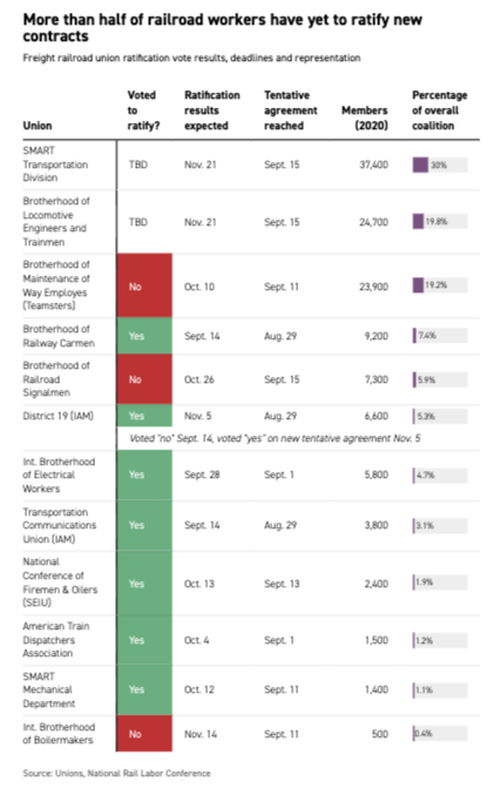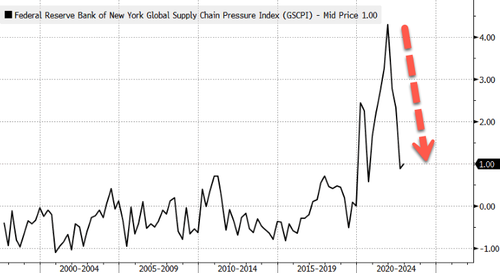Two Largest RR Unions Split Over Labor Deal As Strike Looms
Nov 21, 2022 16:11:16 GMT -5
Post by schwartzie on Nov 21, 2022 16:11:16 GMT -5
Two Largest Railroad Unions Split Over Labor Deal As Christmas Strike Looms
BY TYLER DURDEN
MONDAY, NOV 21, 2022 - 12:20 PM
Update: The votes appear to be in for the two largest railroad unions. WSJ reported Brotherhood of Locomotive Engineers and Trainmen (BLET) said 54% of members who participated in the vote would accept the five-year labor deal. However, the International Association of Sheet Metal, Air, Rail, and Transportation Workers (SMART-TD) rejected ratifying the labor agreement.
BLET and SMART-TD represent 62,000 engineers and conductors, or about half of all unionized rail workers. SMART-TD said it would head back to the negotiating table with the railroads for a revised deal with a Dec. 8 deadline. If no agreement is struck by the deadline, strikes could begin as soon as Dec. 9.
"SMART-TD members with their votes have spoken, it's now back to the bargaining table.
"This can all be settled through negotiations and without a strike," said SMART-TD President Jeremy Ferguson.
SMART-TD said 50.87% of members voted against the labor contract.
Peter Kennedy, director of strategic coordination research at BMWED, told Axios that he's surprised about the no vote:
"This is the best pay package I've seen in my career.
"If employees are willing to vote that down because of the lack of paid sick time, that tells you something."
"Our expectation is that no matter what happens, Congress is still going to need to step in," Scott Jensen, director of issue communications at the American Chemistry Council, told Axios.
Any strike could damage the US economy and risk reversing multiple quarters of supply chain easement. It's why the Biden administration will try to do everything in its power to avert a strike next month.
"But whether a strike will occur is still unclear. Congress could intervene before the December deadlines by crafting legislation that would require the unions to accept the agreements, with the possibility of binding arbitration or other ways to address contentious issues," FreightWaves said.
* * *
Two of the largest railroad unions representing conductors and engineers will announce Monday the results of votes on a tentative contract deal with freight workers -- and a no vote could force the White House to intervene to avert a labor action that would reverse recent gains made in easing supply chains.
The Brotherhood of Locomotive Engineers and Trainmen (BLET) and the transportation division of the International Association of Sheet Metal, Air, Rail, and Transportation Workers (SMART-TD) represent 62,000 engineers and conductors or about half of all unionized rail workers are set to announce vote today, according to Reuters.
Seven of the 12 unions have voted to ratify the labor agreement with railroads, but three have voted it down, leaving BLET and SMART-TD the last to vote on the contract.

Source: Politico
A no vote from either BLET or SMART-TD would increase the threat of a strike, pivoting the balance of power in the unions' favor. But even if both unions agree on the deal, potential turmoil is not over because the three unions have rejected a tentative contract agreement brokered by Labor Secretary Marty Walsh in September. Unions are unhappy with railroads because they're unwilling to adopt leave and attendance policies and paid sick days in new contracts.
Last week, the U.S. Chamber of Commerce said congressional involvement is necessary to thwart rail disruptions, warning any shutdown would be catastrophic for the economy during the holiday season.
"A rail shutdown could freeze almost 30% of U.S. cargo shipments by weight, stoke inflation, cost the American economy as much as $2 billion per day and unleash a cascade of transport woes affecting U.S. energy, agriculture, manufacturing, healthcare and retail sectors," Reuters said.
In September, the Biden administration helped avert a rail strike with last-minute contract talks between rail companies and unions at the Labor Department. If a strike does unfold, which the earliest would be as soon as Dec. 5 after the first cooling-off period ends for the unions, then all the progress in the supply chain easing since summer could evaporate overnight.
The New York Fed supply chain pressure index has reverted nearly to "normal" levels following the pandemic spike. Transportation pressures have subsided as prices for shipping containers on cargo ships to trucking rates have all slid in the back half of the year as the Federal Reserve's most aggressive interest rate hikes in four decades cool the demand side of the economy.

"Look, what a terrible Christmas gift that would be to give to the American people at this point. Right before Christmas, shutting down our supply chain," Rep. Rick Crawford (R-Ark.), the top Republican on the House subcommittee that governs railroads, told POLITICO.
Crawford added: "So we've got something prepared if necessary, but I'm hoping it's not necessary."
link
BY TYLER DURDEN
MONDAY, NOV 21, 2022 - 12:20 PM
Update: The votes appear to be in for the two largest railroad unions. WSJ reported Brotherhood of Locomotive Engineers and Trainmen (BLET) said 54% of members who participated in the vote would accept the five-year labor deal. However, the International Association of Sheet Metal, Air, Rail, and Transportation Workers (SMART-TD) rejected ratifying the labor agreement.
BLET and SMART-TD represent 62,000 engineers and conductors, or about half of all unionized rail workers. SMART-TD said it would head back to the negotiating table with the railroads for a revised deal with a Dec. 8 deadline. If no agreement is struck by the deadline, strikes could begin as soon as Dec. 9.
"SMART-TD members with their votes have spoken, it's now back to the bargaining table.
"This can all be settled through negotiations and without a strike," said SMART-TD President Jeremy Ferguson.
SMART-TD said 50.87% of members voted against the labor contract.
Peter Kennedy, director of strategic coordination research at BMWED, told Axios that he's surprised about the no vote:
"This is the best pay package I've seen in my career.
"If employees are willing to vote that down because of the lack of paid sick time, that tells you something."
"Our expectation is that no matter what happens, Congress is still going to need to step in," Scott Jensen, director of issue communications at the American Chemistry Council, told Axios.
Any strike could damage the US economy and risk reversing multiple quarters of supply chain easement. It's why the Biden administration will try to do everything in its power to avert a strike next month.
"But whether a strike will occur is still unclear. Congress could intervene before the December deadlines by crafting legislation that would require the unions to accept the agreements, with the possibility of binding arbitration or other ways to address contentious issues," FreightWaves said.
* * *
Two of the largest railroad unions representing conductors and engineers will announce Monday the results of votes on a tentative contract deal with freight workers -- and a no vote could force the White House to intervene to avert a labor action that would reverse recent gains made in easing supply chains.
The Brotherhood of Locomotive Engineers and Trainmen (BLET) and the transportation division of the International Association of Sheet Metal, Air, Rail, and Transportation Workers (SMART-TD) represent 62,000 engineers and conductors or about half of all unionized rail workers are set to announce vote today, according to Reuters.
Seven of the 12 unions have voted to ratify the labor agreement with railroads, but three have voted it down, leaving BLET and SMART-TD the last to vote on the contract.

Source: Politico
A no vote from either BLET or SMART-TD would increase the threat of a strike, pivoting the balance of power in the unions' favor. But even if both unions agree on the deal, potential turmoil is not over because the three unions have rejected a tentative contract agreement brokered by Labor Secretary Marty Walsh in September. Unions are unhappy with railroads because they're unwilling to adopt leave and attendance policies and paid sick days in new contracts.
Last week, the U.S. Chamber of Commerce said congressional involvement is necessary to thwart rail disruptions, warning any shutdown would be catastrophic for the economy during the holiday season.
"A rail shutdown could freeze almost 30% of U.S. cargo shipments by weight, stoke inflation, cost the American economy as much as $2 billion per day and unleash a cascade of transport woes affecting U.S. energy, agriculture, manufacturing, healthcare and retail sectors," Reuters said.
In September, the Biden administration helped avert a rail strike with last-minute contract talks between rail companies and unions at the Labor Department. If a strike does unfold, which the earliest would be as soon as Dec. 5 after the first cooling-off period ends for the unions, then all the progress in the supply chain easing since summer could evaporate overnight.
The New York Fed supply chain pressure index has reverted nearly to "normal" levels following the pandemic spike. Transportation pressures have subsided as prices for shipping containers on cargo ships to trucking rates have all slid in the back half of the year as the Federal Reserve's most aggressive interest rate hikes in four decades cool the demand side of the economy.

"Look, what a terrible Christmas gift that would be to give to the American people at this point. Right before Christmas, shutting down our supply chain," Rep. Rick Crawford (R-Ark.), the top Republican on the House subcommittee that governs railroads, told POLITICO.
Crawford added: "So we've got something prepared if necessary, but I'm hoping it's not necessary."
link


